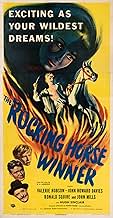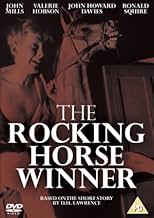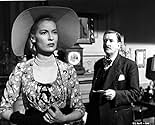VALUTAZIONE IMDb
7,2/10
1507
LA TUA VALUTAZIONE
Aggiungi una trama nella tua linguaA young boy receives a rocking horse for Christmas and soon learns that he is able to pick the winning horse at the races.A young boy receives a rocking horse for Christmas and soon learns that he is able to pick the winning horse at the races.A young boy receives a rocking horse for Christmas and soon learns that he is able to pick the winning horse at the races.
- Regia
- Sceneggiatura
- Star
Anthony Holles
- Bowler Hat
- (non citato nei titoli originali)
Melanie Mackenzie
- Matilda Grahame
- (non citato nei titoli originali)
Michael Ripper
- 2nd Chauffeur
- (non citato nei titoli originali)
Johnnie Schofield
- 1st Chauffeur
- (non citato nei titoli originali)
Caroline Steer
- Joan Grahame
- (non citato nei titoli originali)
Recensioni in evidenza
I've seen a few rocking horses in my time, but none that looked like this one. With its predatory teeth, gaping mouth, and flaring eyes, it looks more like Halloween than X-mas. No wonder it's got supposedly demonic powers. But then the social-climbing parents need help of the monetary kind. Mom (Hobson) isn't happy with just a big house and servants. She wants top status among the British upper-class, and by golly she'll spend whatever it takes, affordable or not. Meanwhile, Dad (Sinclair) tries to keep up by losing at gambling, while Uncle Oscar (Squire) is finally fed up with doling out money from the family trust. That leaves the kids (Davies, et.al.) to make out as best they can with neglectful parents. So where will the money come from, and how will the kids connect with Mom. Enter an infernal toy.
I can see the premise being done on the Twilight Zone, but certainly not to better effect. With his rather narrow eyes, little Paul (Davies) is positively scary when demonically whipping both himself and the wooden horse into a sweaty frenzy. A thousand gory films could not register more strongly than these inspired scenes. It's a unnerving spectre that moves the entire film into a special category of its own.
Surprisingly, the suspense of the rocking horse is not built up in the movie's main part. Instead, the film's majority deals with more ordinary matters: placing bets, pawning dresses, Uncle Oscar, Bassett (Mills) and Paul. Thus a natural contrast is laid for the demonic scenes. Nonetheless, the acting is first-rate, though Sinclair pretty much fades into the background as Dad, while Hobson's mom takes center stage in sleekly determined fashion. Then again, Mills is especially winning as the humane handy man. Happily, he furnishes needed companionship for the lonely boy. And, given the parent's upper-class pretensions, I detect a comment on the effects of Britain's traditional class system.
To me, however, it's never clear whether the whispering comes from the house or from Paul's internalizing of the family's money troubles. But, either way, the never-ending need for picking race-horse winners drives poor Paul into continuing his rocking horse frenzy. The tragedy lies in the personal toll this takes on him for the sake of his generally oblivious mother. Still, it is possible, unless I missed something, that Paul is just lucky picking winners rather than rocking horse possessed. After all, he wants to think he's lucky and maybe he is. In that case, no supernatural would be involved. Instead the upshot would be how an imaginative boy internalizes overriding family greed. In that case, I think the ending would be even more tragic. I may be mistaken, but I don't think the screenplay forecloses this second possibility. Either way, however, those final scenes are genuinely memorable.
Speaking of endings, it's certainly not one Hollywood's Motion Picture Code would have permitted. Good for the British. Because what we're left with is a truly remarkable one-of-a- kind, whose moral is as timely now as 6 decades ago. Don't miss it.
I can see the premise being done on the Twilight Zone, but certainly not to better effect. With his rather narrow eyes, little Paul (Davies) is positively scary when demonically whipping both himself and the wooden horse into a sweaty frenzy. A thousand gory films could not register more strongly than these inspired scenes. It's a unnerving spectre that moves the entire film into a special category of its own.
Surprisingly, the suspense of the rocking horse is not built up in the movie's main part. Instead, the film's majority deals with more ordinary matters: placing bets, pawning dresses, Uncle Oscar, Bassett (Mills) and Paul. Thus a natural contrast is laid for the demonic scenes. Nonetheless, the acting is first-rate, though Sinclair pretty much fades into the background as Dad, while Hobson's mom takes center stage in sleekly determined fashion. Then again, Mills is especially winning as the humane handy man. Happily, he furnishes needed companionship for the lonely boy. And, given the parent's upper-class pretensions, I detect a comment on the effects of Britain's traditional class system.
To me, however, it's never clear whether the whispering comes from the house or from Paul's internalizing of the family's money troubles. But, either way, the never-ending need for picking race-horse winners drives poor Paul into continuing his rocking horse frenzy. The tragedy lies in the personal toll this takes on him for the sake of his generally oblivious mother. Still, it is possible, unless I missed something, that Paul is just lucky picking winners rather than rocking horse possessed. After all, he wants to think he's lucky and maybe he is. In that case, no supernatural would be involved. Instead the upshot would be how an imaginative boy internalizes overriding family greed. In that case, I think the ending would be even more tragic. I may be mistaken, but I don't think the screenplay forecloses this second possibility. Either way, however, those final scenes are genuinely memorable.
Speaking of endings, it's certainly not one Hollywood's Motion Picture Code would have permitted. Good for the British. Because what we're left with is a truly remarkable one-of-a- kind, whose moral is as timely now as 6 decades ago. Don't miss it.
This is about a British family. The mother (Valerie Hobson) spends beyond her means. The father gambles...badly and loses his job. The family is close to bankruptcy when their young son Paul (John Howard Davies) develops this uncanny ability to predict winners in horse races. How does he do it? By riding his rocking horse.
I read the D.H. Lawrence short story back in college in the 1980s and never forgot it. I heard about this film but was afraid to see it...I didn't think there was any way to film the story without it looking stupid. Also this movie is hard to find. I finally did catch it and I was impressed. They managed to take a very dark and strange short story and make an excellent movie out of it. It moves quickly (it's only 90 minutes) and I was never bored for one second. The acting really helps to carry this one. Hobson is just OK as the mother but Davies as the little boy, John Mills as Bassett and Ronald Squire as Uncle Oscar are just great. Ultimately the movie is sad and depressing but just incredible. This was way too ahead of its time to connect with audiences of 1950 and it (sadly) remains unknown to this day. Well worth seeing.
I read the D.H. Lawrence short story back in college in the 1980s and never forgot it. I heard about this film but was afraid to see it...I didn't think there was any way to film the story without it looking stupid. Also this movie is hard to find. I finally did catch it and I was impressed. They managed to take a very dark and strange short story and make an excellent movie out of it. It moves quickly (it's only 90 minutes) and I was never bored for one second. The acting really helps to carry this one. Hobson is just OK as the mother but Davies as the little boy, John Mills as Bassett and Ronald Squire as Uncle Oscar are just great. Ultimately the movie is sad and depressing but just incredible. This was way too ahead of its time to connect with audiences of 1950 and it (sadly) remains unknown to this day. Well worth seeing.
Suspenseful, intriguing, disturbing, heartbreaking, atmospherically crafted by director and photographer, this is a gem of a movie that was too out of the rut to be appreciated by audiences in its day. The characters are not only totally believable but so convincingly acted that few viewers will have any difficulty accepting the plot's key supernatural premise. Because they are so credibly realistic, however, some of the people in this movie (the lad's mother and father, for instance) are far from sympathetic. This trait doubtless alienated contemporary audiences even further, particularly those looking for escape into an idealistic world of smilingly duty-bound, hardworking mothers and bumbling yet well-intentioned dads.
As stated, all the players are excellentincluding producer John Mills who cast himself in a small but key rolebut three are so outstanding it would churlish not to mention them individually: Valerie Hobson is perfect as the selfish, socially aspiring mum; John Howard Davies is likewise brilliant as the driven, psychotic boy of the title; and it's great to see Ronald Squire utilizing his talents to the full in a major role.
The pace never slackens and the movie incorporates so many unforgettably powerful scenes, it would be impossible to single just three or four for special praise.
In short: a masterpiece from screenwriter/director Anthony Pelissier (who handled only a handful of movies), photographer Desmond Dickinson and a fine array of artists and craftspeople under the control of actor/producer John Mills.
As stated, all the players are excellentincluding producer John Mills who cast himself in a small but key rolebut three are so outstanding it would churlish not to mention them individually: Valerie Hobson is perfect as the selfish, socially aspiring mum; John Howard Davies is likewise brilliant as the driven, psychotic boy of the title; and it's great to see Ronald Squire utilizing his talents to the full in a major role.
The pace never slackens and the movie incorporates so many unforgettably powerful scenes, it would be impossible to single just three or four for special praise.
In short: a masterpiece from screenwriter/director Anthony Pelissier (who handled only a handful of movies), photographer Desmond Dickinson and a fine array of artists and craftspeople under the control of actor/producer John Mills.
I first saw this film as a pare-teen many years ago and it stuck in my memory all these years; I suppose I identified, at the time, with the idea that events could be somehow manipulated and controlled by sheer intensity. When I recently saw this film on DVD, it still struck a nerve and, as an adult, realized what a strong film it is and why it had been in my memory all these years. Because the file is so old, many of the mannerisms in the movie appear quaint now, but the themes are timeless; sensitive kids sensing parental dysfunction and taking it upon themselves to try and "fix" things. It's interesting to note that John Mills, then a staple in English films, produced the film. I would recommend this film to anyone with a penchant for psychological drama of the old school.
This is a very intriguing British film, quite unlike most others from the period; it's a pretty dark Freudian tale, from a D H Lawrence short story, whose overt depiction of a schoolboy and his magic toy gets away with a strictly taboo subtext. The focus is on a well-to-do household of the period, in which the hierarchy of adults and children is strictly defined; the parents try to keep their son Paul, wearing short trousers even in the depths of winter, innocent of their adult concerns in particular, their problems with money. After discovering that his rocking horse gives him secret powers when he rides it hard enough, with giddy camera-work showing how it feels when he 'gets there', the boy tries to usurp his father's role to provide his mother with what she needs. John Mills produced the film, and his interest was no doubt linked to his typecast image: he normally plays rather piously unimpeachable characters, so it's quite a shock to see him here directing the lad's first experience of 'riding'. The only slight difficulty is that the boy actor needed to be nearer his early teens to carry the weight of the story's darker implications.
Lo sapevi?
- QuizBassett says that he had "... fine plans for teaching Gordon Richards a thing or two...". Gordon Richards (1904 - 1986) was an English jockey. He was the Champion Jockey in British flat horse-racing 26 times, a record that still stands.
- Citazioni
[last lines]
Hester Grahame: I wanted to see the end of it, just wanted to be sure it had gone. Gone for good.
Bassett: You won't never see the end of it, ma'am, nor will I. As long as ever we'll live, we'll remember, and we'll know just what it is was done.
- ConnessioniVersion of Winner (1977)
- Colonne sonoreSilent Night
(uncredited)
Music by Franz Xaver Gruber
English lyrics by John Freeman Young
Sung by the carollers
I più visti
Accedi per valutare e creare un elenco di titoli salvati per ottenere consigli personalizzati
Dettagli
- Data di uscita
- Paese di origine
- Lingua
- Celebre anche come
- Dobitnik sa drvenog konjića
- Luoghi delle riprese
- Denham Studios, Denham, Buckinghamshire, Inghilterra, Regno Unito(studio: made at Denham Studios, London, England)
- Aziende produttrici
- Vedi altri crediti dell’azienda su IMDbPro
- Tempo di esecuzione
- 1h 31min(91 min)
- Colore
- Proporzioni
- 1.37 : 1
Contribuisci a questa pagina
Suggerisci una modifica o aggiungi i contenuti mancanti



























